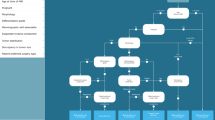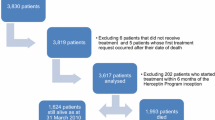Abstract
Purpose
In 2003, a certification system was introduced to ensure high standards of oncological care in breast cancer patients in Germany. Certified breast cancer centers (BCCs) must fulfill specific requirements including quality indicators (QI) derived from the clinical guidelines that are evaluated in annual audits. When target values for QIs are not fulfilled, centers need to give explanations. We analyzed data from BCCs for a selected indicator: the recommendation of trastuzumab for patients with early HER-2-positive invasive breast cancer. We investigated explanations given in cases when trastuzumab was not recommended to see whether this was justified.
Methods
Patient data from 274 BCCs treating 53,777 primary cases in 2015 were analyzed using descriptive statistics.
Results
In the 274 BCC sites, 5700 primary patients with early HER-2-positive breast cancer were treated in 2015. 128 sites (46.7%) did not reach the target value of 95% trastuzumab recommendation and thus had to give explanations. In these 128 sites, 2663 primary HER-2-positive breast cancer patients were treated, 343 (12.9%) of whom did not receive a recommendation for adjuvant trastuzumab treatment. All 128 sites delivered explanations. Overall, 450 explanations were given, allowing multiple explanations for single patients. No explanation was given for 8 of the 343 patients (2.3%). The most common given explanation was multi-/comorbidity (45.5%).
Conclusions
The analysis suggests thorough decision-making when quality indicator target values for a trastuzumab recommendation were not fulfilled. Our data do not provide information on whether such decisions have an impact on treatment outcome for these patients.

Similar content being viewed by others
References
Kowalski C, Graeven U, von Kalle C, Lang H, Beckmann MW, Blohmer JU et al (2017) Shifting cancer care towards multidisciplinarity: the Cancer Center Certification Program of the German Cancer Society. BMC Cancer 17(1):850. https://doi.org/10.1186/s12885-017-3824-1
Campbell SM, Braspenning J, Hutchinson A, Marshall MN (2003) Research methods used in developing and applying quality indicators in primary care. BMJ 326(7393):816–819
German Guideline Program in Oncology (2017) (German Cancer Society, German Cancer Aid, Association of the Scientific Medical Societies). Development of guideline-based quality indicators: methodology for the German Guideline Program in Oncology, version 2.0. 2017. https://www.leitlinienprogramm-onkologie.de/methodik/informationen-zur-methodik/. Accessed 10 Dec 2018
Becker M, Breuing J, Nothacker M, Deckert S, Steudtner M, Schmitt J, Neugebauer E, Pieper D (2018) Guideline-based quality indicators-a systematic comparison of German and international clinical practice guidelines: protocol for a systematic review. Syst Rev. 7(1):5. https://doi.org/10.1186/s13643-017-0669-2
Kowalski C, Ferencz J, Brucker SY, Kreienberg R, Wesselmann S (2014) Quality of care in breast cancer centers: results of benchmarking by the German Cancer Society and German Society for breast diseases. Breast 24(2):118–123. https://doi.org/10.1016/j.breast.2014.11.014. [Epub 13 Dec 2015]
Slamon DJ, Clark GM, Wong GS et al (1987) Human breast cancer: correlation of relapse and survival with amplification of the HER-2/neu oncogene. Science 235(4785):177–182
Wöckel A, Festl J, Stüber T, Brust K et al (2018) Interdisciplinary screening, diagnosis, therapy and follow-up of breast cancer: guideline of the DGGG and the DKG (S3-Level, AWMF Registry Number 032/045OL, December 2017)–Part 1 with recommendations for the screening, diagnosis and therapy of breast cancer. Geburtshilfe Frauenheilkd. 78(10):927–948. https://doi.org/10.1055/a-0646-4522 (Published online 19 Oct 2018)
Petrelli F, Barni S (2012) Meta-analysis of concomitant compared to sequential adjuvant trastuzumab in breast cancer: the sooner the better. Med Oncol 29(2):503–510
Dahabreh IJ et al (2008) Trastuzumab in the adjuvant treatment of early-stage breast cancer: a systematic review and meta-analysis of randomized controlled trials. Oncologist 13(6):620–630
Gianni L et al (2011) Treatment with trastuzumab for 1 year after adjuvant chemotherapy in patients with HER2-positive early breast cancer: a 4-year follow-up of a randomised controlled trial. Lancet Oncol 12(3):236–244
Madarnas Y et al (2008) Adjuvant/neoadjuvant trastuzumab therapy in women with HER-2/neu-overexpressing breast cancer: a systematic review. Cancer Treat Rev 34(6):539–557
Yin W et al (2011) Trastuzumab in the adjuvant treatment of HER2-positive early breast cancer patients: a meta-analysis of published randomized controlled trials. PLoS One 6(6):e21030
Inwald EC, Ortmann O, Zeman F, Koller M, Hofstadter F et al (2014) Guideline concordant therapy prolongs survival in HER2-positive breast cancer patients: results from a large population-based cohort of a cancer registry. BioMed Res Int. 2014:137304
Nothacker MJ, Muche-Borowski C, Kopp IB (2014) Guidelines in the Register of the Association of Scientific Medical Societies in Germany—a quality improvement campaign. Geburtshilfe Frauenheilkund 74(3):260–266
Langer T, Follmann M (2015) The German Guideline Program in Oncology (GGPO): a central core of an evidence-based, patient-centered interdisciplinary oncology? Z Evid Fortbild Qual Gesundhwes. 109(6):437–444. https://doi.org/10.1016/j.zefq.2015.09.007. [Epub 26 Sep 2015]
Society GC, Senology GSf, Centres CCBC, Blohmer JU, Scharl A, Wesselmann S, et al. (2017) Annual Report 2017 of the Certified Breast Cancer Centers. Berlin; 2017. https://doi.org/10.13140/RG.2.1.1805.7204
Kreienberg R, Wöckel A, Wischnewsky M (2018) Highly significant improvement in guideline adherence, relapse-free and overall survival in breast cancer patients when treated at certified breast cancer centres: an evaluation of 8323 patients. Breast 40:54–59. https://doi.org/10.1016/j.breast.2018.04.002
Beckmann MW, Brucker C, Hanf V, Rauh C, Bani MR et al (2011) Quality assured health care in certified breast centers and improvement of the prognosis of breast cancer patients. Onkologie 34(7):362–367. https://doi.org/10.1159/000329601
Acknowledgements
English-language editorial services were provided by Michael Robertson.
Author information
Authors and Affiliations
Contributions
OO conceptualized the research design. JF and SW collected data and checked these for plausibility. CK and ECI developed the plan of analysis, analyzed the data and drafted the manuscript. All of the authors contributed in writing the manuscript during several rounds of discussion. All of the authors have read and approved the final manuscript.
Corresponding author
Ethics declarations
Conflict of interest
SW and CK are employees of the German Cancer Society and JF is an employee of the OnkoZert certification institute. OO is the President of the German Cancer Society. OO has received research funding and advisory board honoraria from pharmaceutical companies that are not related to the research presented here. A full list will be provided by the corresponding author upon request. ECI declares that she has no conflict of interest.
Ethical approval
The study used data from the oncological certification program of the German Cancer Society. Data are collected during the certification process using anonymized data regarding clinical parameters as well as quality indicators. Informed consent is automatically obtained from the patients by signing the hospital treatment contract. Therefore, the Local Ethical Committee of the University of Regensburg stated that an ethical vote was not necessary.
Additional information
Publisher's Note
Springer Nature remains neutral with regard to jurisdictional claims in published maps and institutional affiliations.
Rights and permissions
About this article
Cite this article
Inwald, E.C., Kowalski, C., Wesselmann, S. et al. Recommendation of adjuvant trastuzumab treatment in HER-2-positive breast cancer patients: insights from quality indicator data collected in certified breast cancer centers in Germany, Italy, Austria, and Switzerland. Arch Gynecol Obstet 300, 383–388 (2019). https://doi.org/10.1007/s00404-019-05185-x
Received:
Accepted:
Published:
Issue Date:
DOI: https://doi.org/10.1007/s00404-019-05185-x




